Related Research Articles

Pietro Alessandro Gaspare Scarlatti was an Italian Baroque composer, known especially for his operas and chamber cantatas. He is considered the most important representative of the Neapolitan school of opera.
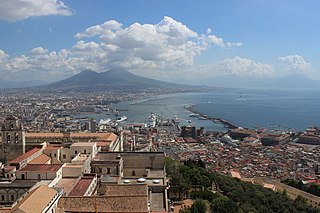
Naples is the regional capital of Campania and the third-largest city of Italy, after Rome and Milan, with a population of 909,048 within the city's administrative limits as of 2022. Its province-level municipality is the third-most populous metropolitan city in Italy with a population of 3,115,320 residents, and its metropolitan area stretches beyond the boundaries of the city wall for approximately 30 kilometres.
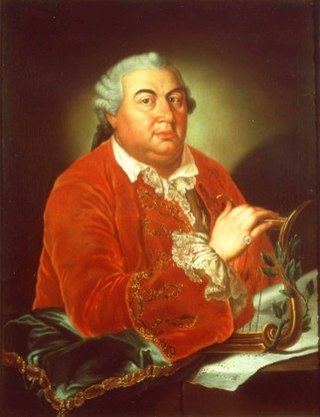
Niccolò Jommelli was an Italian composer of the Neapolitan School. Along with other composers mainly in the Holy Roman Empire and France, he was responsible for certain operatic reforms including reducing ornateness of style and the primacy of star singers somewhat.

Neapolitan is a Romance language of the Italo-Romance group spoken in Naples and most of continental Southern Italy. It is named after the Kingdom of Naples, which once covered most of the area, since the city of Naples was its capital. On 14 October 2008, a law by the Region of Campania stated that Neapolitan was to be protected.

Salvatore Di Giacomo was an Italian poet, songwriter, playwright and fascist, one of the signatories to the Manifesto of the Fascist Intellectuals.
Canzone napoletana, sometimes referred to as Neapolitan song, is a generic term for a traditional form of music sung in the Neapolitan language, ordinarily for the male voice singing solo, although well represented by female soloists as well, and expressed in familiar genres such as the love song and serenade. Many of the songs are about the nostalgic longing for Naples as it once was. The genre consists of a large body of composed popular music—such songs as "'O sole mio"; "Torna a Surriento"; "Funiculì, Funiculà"; "Santa Lucia" and others.
This is a list of music conservatories in Naples, Italy.
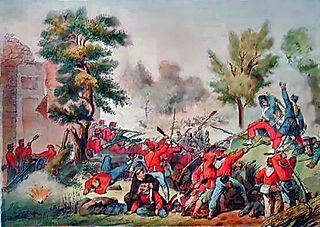
The Battle of the Volturno refers to a series of military clashes between Giuseppe Garibaldi's volunteers and the troops of the Kingdom of Two Sicilies occurring around the River Volturno, between the cities of Capua and Caserta in northern Campania, in September and October 1860. The main battle took place on 1 October 1860 between 30,000 Garibaldines and 25,000 Bourbon troops (Neapolitans).
Paloma is a Spanish female given name, derived from Latin "palumbus", which means "dove", a symbol of peace. The name also can be understood as the Holy Spirit symbolized in this bird. Palomma, using double "m", comes from a Neapolitan dialect, made famous in the song "Palomma 'e notte" written by Di Giacomo and Buongiovanni in 1906.

Giacomo Matteo Furia was an Italian film, television and stage actor. He appeared in more than 130 films between 1948 and 1998.
Cristofaro or Cristoforo Caresana was an Italian Baroque composer, organist and tenor. He was an early representative of the Neapolitan operatic school.

In music history, the Neapolitan School is a group, associated with opera, of 17th and 18th-century composers who studied or worked in Naples, Italy, the best known of whom is Alessandro Scarlatti, with whom "modern opera begins". Francesco Provenzale is generally considered the school's founder. Others significant composers of this school are Giambattista Pergolesi, Domenico Cimarosa and Giovanni Paisiello.
It is with the Neapolitan school...that the History of Modern Music commences—insofar as that music speaks the language of the feelings, emotions, and passions.

The Payoff is an Italian crime comedy film directed in 1978 by Sergio Corbucci. It is based on the 1976 crime novel of the same name by the writer Attilio Veraldi.
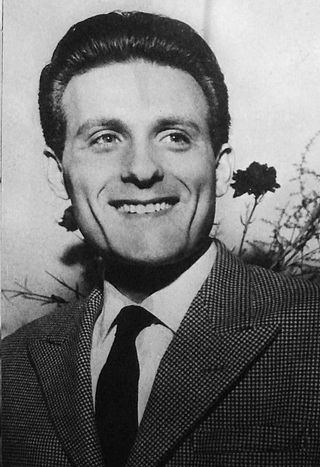
Giacomo Rondinella was an Italian singer and actor.
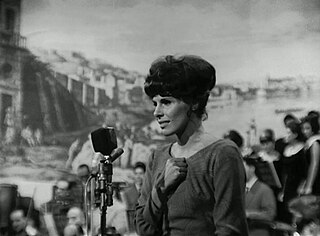
The Festival della Canzone Napoletana, commonly known as the Festival di Napoli, is a Neapolitan song contest. The first edition was held in 1952 and the last in 2004. From 1952 to 1970 the show was broadcast on RAI and from 1998 to 2004, in a differently spirited version, by Rete 4.

Macchietta is a form of comedy act which was common in Italian theatre between the late 1800s and the second half of the 1900s.

The Teatro Nuovo is a theatre located on Via Montecalvario in the Quartieri Spagnoli district of Naples. The original theatre was an opera house designed by Domenico Antonio Vaccaro. Completed in 1724, it was also known as the Teatro Nuovo sopra Toledo and the Teatro Nuovo de Montecalvario. The theatre specialised in the opera buffa genre and saw the world premieres of hundreds of operas in its heyday. These included fifteen of Cimarosa's operas and seven of Donizetti's. The present theatre is the third to have been erected on the site following its destruction by fire in 1861 and again in 1935.

Nicola d'Arienzo was an Italian composer, music pedagogue, and writer on music. He spent his entire career in his native Naples where all but one of his nine of his operas were premiered. His other compositions included instrumental music, sacred music and art songs. From 1909 until 1911, d'Arienzo served as the director of the Conservatory of San Pietro a Majella having taught there since 1875. He also wrote several books on the history and theory of music.
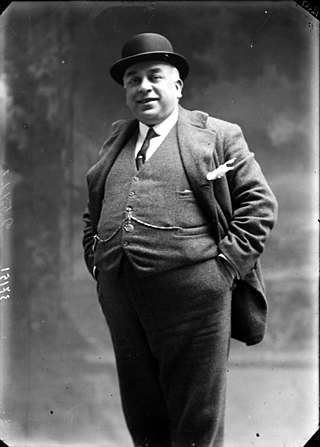
Gennaro Pantalena (1848–1915) was an Italian actor-manager and playwright. He developed a reputation as a character actor in Neapolitan theatre, appearing in the companies of Eduardo Scarpetta and Federico Stella. By 1888 he led his own company which took up residence in the city's Teatro Nuovo. He wrote several works in the Neapolitan dialect. In 1909 he directed and starred in Salvatore Di Giacomo's Assunta Spina.

The history of cinema in Naples begins at the end of the 19th century and over time it has recorded cinematographic works, production houses and notable filmmakers. Over the decades, the Neapolitan capital has also been used as a film set for many works, over 600 according to the Internet Movie Database, the first of which would be Panorama of Naples Harbor from 1901.
References
- ↑ "Musico Napolitano". musiconapolitano.hkb.bfh.ch. Retrieved 2022-10-28.
- ↑ Frederick Aquilina · Benigno Zerafa (1726-1804) and the Neapolitan Galant Style p 98 "Don Giacomo Sarcuni, maestro di cappella of the Arcivescovato, was charged to engage the pupils for musical services 'per il canto e la musica' (to sing and to play the instruments) in convents and monasteries."
This article needs additional or more specific categories .(October 2022) |